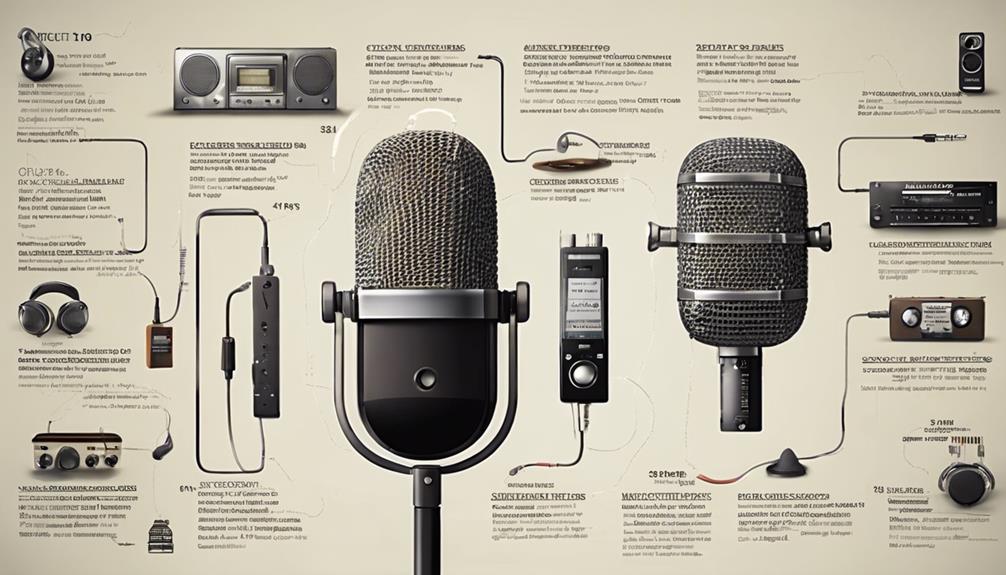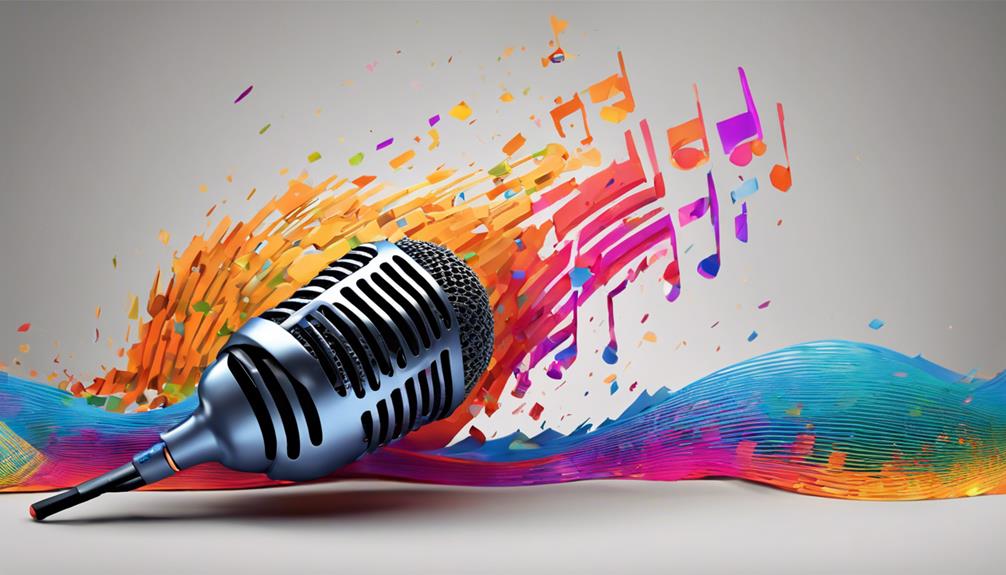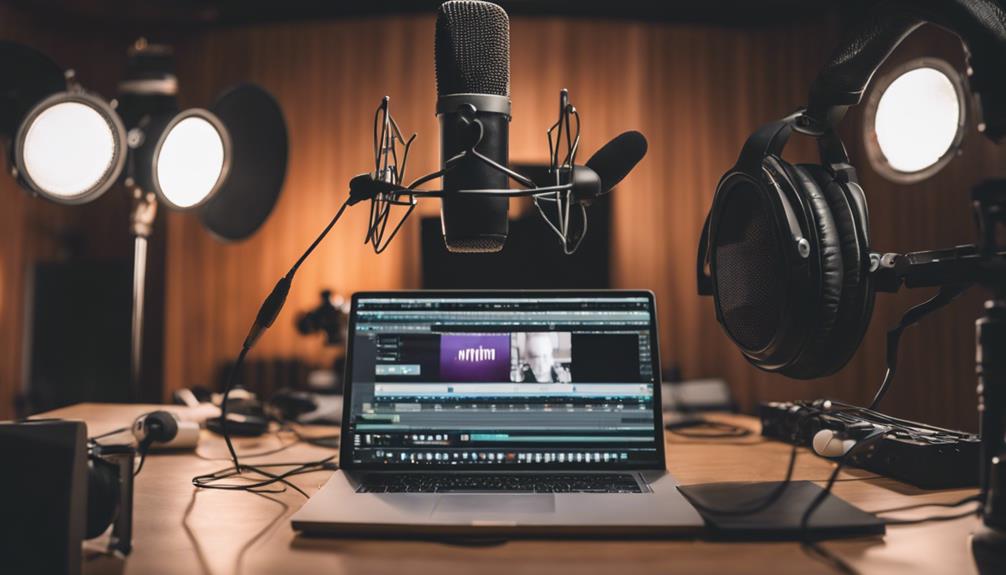Podcasting
Exploring the Podcasting Boom: When Did It Become Popular?
Open the door to the podcasting revolution and uncover how it reshaped audio content consumption.

The podcasting boom became popular in the early 2000s. Key developments like the integration of RSS enclosures and Apple's backing of podcasts in iTunes propelled its rise. These milestones revolutionized how audio content was created, shared, and enjoyed, setting the stage for the podcasting phenomenon we witness today. The introduction of on-demand radio shows and the support from major platforms like Apple further fueled its growth. These pivotal moments marked the beginning of a new era in digital media consumption. Discover more about the fascinating evolution and impact of podcasting from its inception to its current prominence.
Key Takeaways
- Emerged in early 2000s with RSS enclosures.
- Apple's iTunes integration in 2005 boosted visibility.
- True crime podcast 'Serial' in 2014 sparked interest.
- President Obama's appearance in 2015 solidified mainstream status.
- Significant growth in active podcasts since 2008.
Origins of Podcasting
Frequently overlooked in the history of media, podcasting emerged in the early 2000s as a revolutionary form of content delivery. With the introduction of RSS enclosures in 2001, the groundwork was laid for automatic downloading of audio files, paving the way for the podcasting revolution. It wasn't until 2004, when journalist Ben Hammersley coined the term 'podcasting,' that this innovative method of distributing digital audio content truly started to gain recognition.
Apple played a pivotal role in propelling podcasting into the mainstream medium it's today. In 2005, Apple integrated podcast support into iTunes, making it easier for users to discover and subscribe to podcasts. This move notably increased the visibility of podcasts and attracted a broader audience to this new form of media consumption.
Evolution of Podcasting Technology

The evolution of podcasting technology has been marked by significant advancements in on-demand audio delivery and user experience enhancements. From the introduction of RSS enclosures enabling automatic downloads to the integration of video content, podcasting has continually evolved to offer a more immersive experience for listeners. Podcasting clients like Apple Podcasts and Spotify have played a pivotal role in enhancing user accessibility to a vast array of audio content. Technological progress has also led to personalized recommendations, seamless ad insertion, and innovative features that elevate the podcasting experience.
| Advancements in Podcasting Technology | Examples |
|---|---|
| RSS Enclosures | Automatic downloading of audio files |
| On-Demand Radio Shows | Shaping the evolution of podcasting |
| Podcasting Clients | Apple Podcasts and Spotify enhancing user experience |
These developments have not only expanded the reach of podcasts but have also paved the way for a more dynamic and engaging audio content landscape.
Mainstream Recognition of Podcasting

Podcasting's mainstream recognition accelerated following Apple's integration of podcasts into iTunes in 2005. This move opened the floodgates for podcasters to reach a wider audience, marking a pivotal moment in the medium's history. The term 'podcasting' was even crowned Word of the Year by the New Oxford American Dictionary that same year, showcasing its rapid ascent into popular culture.
In 2014, the true crime podcast Serial took the world by storm, becoming a cultural phenomenon and capturing the attention of millions. This gripping series not only entertained but also sparked a newfound fascination with podcasts, drawing in listeners from all walks of life.
President Barack Obama's appearance on 'WTF with Marc Maron' in 2015 further solidified podcasts as a mainstream platform. By 2016, podcasts like 'Serial' and 'The Joe Rogan Experience' had amassed massive followings, firmly establishing podcasting in the domain of mainstream media. The true crime genre, in particular, played a significant role in propelling podcasts into the spotlight, paving the way for diverse content to thrive in this dynamic landscape.
Impact of RSS Enclosures

Utilizing RSS enclosures revolutionized the distribution of audio content, transforming how podcasts are consumed and shared. This technology allowed for the automatic download of audio files, making it easier for users to subscribe to podcasts and receive new episodes directly on their devices.
As a result, podcast consumption became more convenient and accessible, driving the growth of the medium. Podcasters leveraged RSS enclosures to reach a broader audience and establish loyal listener bases, leading to the popularization of podcasting as a mainstream form of media consumption.
The introduction of RSS enclosures played a pivotal role in shaping the landscape of content distribution, enabling seamless access to a wide range of audio content. Through this innovative technology, podcasts have become an integral part of modern media consumption habits, offering a diverse array of content to listeners worldwide.
RSS enclosures have truly revolutionized the way we consume and share podcasts, contributing significantly to the medium's widespread adoption and success.
Role of Apple's Itunes Platform

Apple's iTunes platform revolutionized podcast consumption by offering a convenient way to access and listen to a wide range of shows. With the introduction of the Podcasts app in 2012, Apple made it easier for users to discover and subscribe to podcasts, contributing to the medium's widespread popularity.
Podcasters found a valuable distribution channel in iTunes, benefiting from increased visibility and audience engagement.
Apple's Itunes Influence
The integration of podcasts into the iTunes platform in 2005 revolutionized the way users discovered and consumed audio content. iTunes played a pivotal role in boosting podcast consumption and production, leading to a surge in podcast listenership. The platform's accessibility made it effortless for users to explore and enjoy a wide range of podcasts, propelling many shows to new heights of popularity. Below is a table highlighting the key points of Apple's iTunes influence in the podcasting landscape:
| iTunes Influence | Details |
|---|---|
| Enhanced Podcast Discovery | Easy access to a variety of podcasts |
| Increased Listener Engagement | Convenient subscription and download options |
| Boosted Content Creation | Encouraged the development of diverse podcast offerings |
| Amplified Podcast Reach | Helped popular shows gain widespread audience exposure |
| Streamlined User Experience | Simplified the process of finding and enjoying podcasts |
Apple's iTunes platform truly reshaped the podcasting industry, fostering innovation and expanding the reach of audio content.
Podcasting Platform Dominance
Playing a pivotal role in the podcasting landscape, iTunes revolutionized how audio content was discovered and consumed. Apple's iTunes platform became a powerhouse for podcast discovery, offering subscription features that made podcasts widely accessible.
This centralized platform not only expanded the audience reach but also boosted engagement with podcasters. By providing a user-friendly interface and hosting capabilities, iTunes greatly contributed to the growth of podcasting as a mainstream medium.
Podcasters benefited from increased visibility and promotion through iTunes, further solidifying its dominance in the podcasting platform arena. The seamless integration of hosting, distribution, and promotion on iTunes made it a go-to platform for both creators and listeners, shaping the podcasting industry as it stands today.
Global Expansion of Podcasting

The growth of podcasting worldwide is undeniable, with the market expected to reach USD 89.64 billion by 2028, showcasing its monumental impact.
Podcasts not only entertain but also play a significant role in shaping cultural conversations globally.
With diverse audiences tuning in, podcasts have become a powerful medium for sharing stories, knowledge, and perspectives across borders.
Podcasting Growth Worldwide
With podcasting's global market value projected to skyrocket to USD 89.64 Billion by 2028, its widespread adoption and impact on various industries are undeniable. The versatility of audio files has enabled a vast range of content, attracting a growing number of podcast listeners globally. This expansion has created significant monetization opportunities, prompting increased competition among industry giants like Apple, Amazon, and Spotify.
As the podcasting market evolves with new content formats and innovative strategies, the industry continues to flourish. Academic institutions are also leveraging podcasts as a tool for distributing educational materials, further contributing to the medium's growth. The positive outlook for podcasting signals continued growth in both listenership and revenue, solidifying its global influence and market trends.
Cultural Impact of Podcasts
Embracing diverse cultural influences, the global expansion of podcasting has revolutionized content creation and audience engagement.
With podcasts in various languages and dialects, traditional customs and modern trends blend seamlessly, offering listeners a diverse range of shows to explore. Different countries contribute their unique perspectives, enriching the podcasting landscape and catering to multicultural audiences worldwide.
Global platforms facilitate creators in reaching international listeners, transcending borders and fostering inclusivity.
This expansion hasn't only connected people globally but also promoted cultural exchange and understanding on a scale previously unseen. The impact of podcasts extends far beyond entertainment, sparking meaningful conversations and creating a sense of unity among listeners worldwide.
Diverse Podcasting Audiences
Exploring the vast array of podcast audiences worldwide reveals a rich tapestry of cultural preferences and interests. The global expansion of podcasting has connected communities around the world, transcending borders and traditional radio limitations.
Podcasts cover a wide range of topics, catering to the diverse tastes of a truly international audience. These audio shows investigate various languages, local issues, and global trends, reflecting the cultural diversity of our interconnected world.
Factors Contributing to Podcasting Boom

The enhanced accessibility of technology has greatly contributed to the podcasting boom. Podcasting's growth as a powerful content marketing tool since its inception in 2003 is undeniable. The ability for individuals to control their platforms and narratives independently has revolutionized the sharing of untold stories. In the table below, we highlight key factors driving the podcasting boom:
| Factors | Description | Impact |
|---|---|---|
| Technology Accessibility | Increased access to smartphones and other portable media devices | Facilitates on-the-go listening |
| Independent Content | Freedom from traditional media gatekeepers, allowing for diverse and unfiltered content creation | Fosters creativity and authenticity |
| Growth of Podcasting | Surge in active podcasts since 2008 | Indicates industry expansion |
| Portable Media | Podcasts can be accessed anytime, anywhere | Enhances convenience for listeners |
| Untold Stories | Platform for sharing diverse narratives that were previously overlooked | Promotes inclusivity and diversity |
Frequently Asked Questions
When Did Podcasting Start Gaining Popularity?
Podcasting started gaining popularity in the mid-2000s, fueled by the release of Apple's iTunes 4.9 with podcast support. Major media outlets like BBC, NPR, and CNN began offering podcasts in 2005, further boosting its appeal.
The number of podcast subscriptions on iTunes surpassed 1 million that same year, indicating a growing listener base. The rise of portable media players and increased internet connectivity contributed to the rapid rise of podcasting.
When Was the Podcast Boom?
The podcast boom hit its peak around the mid-2000s, with significant growth in shows and listeners. One standout year was 2008, where the number of active podcasts surged, showcasing the medium's power and potential.
This period marked a turning point in podcast popularity, setting the stage for its continued rise as a preferred form of content consumption. The landscape of podcasting was forever changed as it became more accessible and widely embraced.
When Did People Start Listening to Podcasts?
We started listening to podcasts around the mid-2000s. The rise of the iPod and the term 'podcast' helped boost the medium's popularity. By 2005, Apple integrated podcast support into iTunes, making it easier for users to find and enjoy podcasts.
The convenience of on-demand audio and the diverse range of genres drew more listeners over time. Today, podcasts have become a mainstream form of entertainment and education.
Why Are Podcasts Suddenly so Popular?
Podcasts are suddenly so popular because they offer a diverse range of topics tailored to individual interests.
The on-demand nature of podcasts allows us to consume content whenever and wherever we want, enhancing our listening experience.
The accessibility of podcasts on smartphones and smart speakers has revolutionized how we engage with audio content, making it a convenient and enriching pastime.
The boom in podcasting reflects our desire for personalized, on-the-go entertainment.
Conclusion
To sum up, the podcasting boom has been fueled by a combination of technological advancements, mainstream recognition, and global expansion.
For instance, the true crime podcast 'Serial' became a cultural phenomenon, drawing millions of listeners and sparking conversations worldwide.
As podcasting continues to evolve and reach new audiences, it's clear that this medium has established itself as a powerful platform for storytelling and information sharing.
Podcasting
A Comprehensive Guide to Podcasts' Good Effects on Your Brain
Gain a deeper insight into how podcasts positively impact your brain, enhancing cognition and sparking creativity – discover the transformative power of podcast consumption!

Explore the world of podcasts for a brain boost! Podcasts stimulate brain regions, enhance cognitive engagement, and trigger the release of dopamine. They offer an immersive experience, boost concentration, and challenge your mind. Memory retention improves, neural connections strengthen, and critical thinking skills expand. Creativity flourishes, stress reduces, and moods enhance through podcast consumption. Different genres stimulate various brain regions, offering diverse storytelling experiences. Incorporate podcasts into daily routines for personal growth and enrichment. Harness the potential of your mind with podcasts – embark on a journey of cognitive well-being and brain function enhancement.
Key Takeaways
- Podcasts stimulate brain regions, enhance cognition, and boost memory.
- They provide mental exercise, improve concentration, and activate dopamine release.
- Listening improves memory retention, aids in memory formation, and strengthens neural connections.
- Podcasts expand knowledge, enhance critical thinking, and offer intellectual growth opportunities.
- They foster creativity, inspire innovative thinking, and reduce stress for overall brain health.
Benefits of Podcasts on Brain Health
Listening to podcasts actively benefits brain health by stimulating various regions of the brain and enhancing cognitive engagement. When we tune in to podcasts, we aren't only entertaining ourselves but also giving our brains a workout. Research has shown that podcast listening can activate the mesolimbic pathway in our brains, triggering the release of dopamine, which is associated with pleasure and reward. This stimulation of multiple brain regions provides a comprehensive mental exercise that can contribute positively to our overall brain health.
Moreover, podcasts engage sensory areas of our brain, creating an immersive listening experience that keeps our minds active and alert. By demanding focused attention, podcasts help limit distractions and enhance our cognitive engagement, ultimately promoting improved brain health. However, it's essential to strike a balance, as overloading our brains with continuous podcast audio may have adverse effects on memory, emotions, and nervous system functions. Therefore, incorporating podcasts into our routine in a mindful and moderate manner can harness their benefits for enhanced brain health.
Cognitive Enhancement Through Podcasts

Stimulating various brain regions simultaneously, podcasts offer a unique avenue for enhancing cognitive function and promoting overall brain health. When we listen to podcasts, our brains are actively engaged, leading to cognitive enhancement through the following ways:
- Immersive Experience: Podcast stories engage sensory areas of the brain, creating an immersive listening experience that boosts cognitive engagement.
- Concentration Boost: The concentrated attention required for podcast listening helps keep the brain actively engaged, promoting mental sharpness and focus.
- Challenge and Growth: Podcasts demand heightened concentration, challenging the brain and promoting neural activity for cognitive enhancement.
- Mental Stimulation: The continuous mental stimulation from podcasts can lead to cognitive exhaustion, pushing the brain to work harder and enhancing cognitive function.
- Neural Activation: Active podcast listening experiences stimulate neural activity, contributing to cognitive enhancement and overall brain health.
Podcasts not only entertain but also provide a platform for cognitive growth and mental agility.
Memory Improvement via Podcast Listening

Listening to podcasts not only entertains but also enhances our memory retention by engaging different brain regions simultaneously. The immersive experience of podcast stories activates sensory areas, making the content more memorable.
Our brains work diligently during podcast listening to transform audio input into full sensory experiences, aiding in memory formation.
Enhancing Cognitive Recall
Enhancing cognitive recall through podcast listening can greatly improve memory retention and learning abilities. When we actively engage with educational podcasts, our brains benefit in numerous ways, such as:
- Enhanced Memory Retention: Podcasts stimulate memory encoding areas, aiding in better information recall.
- Improved Learning: Engaging with podcast content boosts our ability to retain and apply new knowledge effectively.
- Strengthened Neural Connections: Active listening to podcasts strengthens the neural pathways linked to memory functions.
- Boosted Cognitive Abilities: Regular podcast consumption can enhance overall cognitive skills, including memory recall.
- Optimized Memory Functions: Podcasts help optimize our brain's memory processes, leading to better cognitive performance.
Stimulating Brain Connections
Engaging with podcasts can greatly enhance brain connections, leading to improved memory function through active participation in content consumption. Podcast listeners benefit from the stimulation of various brain regions, which aids in memory improvement and cognitive function.
By actively engaging with podcast content, neural connections are strengthened, enhancing memory formation and retention. Research indicates that podcast consumption can boost neuroplasticity, further contributing to memory enhancement. The vivid mental imagery created by podcast stories assists in memory encoding and retrieval processes.
Additionally, heightened focus during podcast listening sessions promotes better information processing and memory consolidation. Overall, podcasts serve as powerful tools for enhancing brain connections and optimizing memory performance in individuals seeking cognitive benefits.
Boosting Information Retention
Podcasts not only stimulate brain connections but also contribute greatly to boosting information retention, particularly in enhancing memory through active listening. When it comes to memory retention, listening to podcasts can provide significant benefits. Here's why podcasts every day can help improve memory retention:
- Engaging multiple brain regions simultaneously
- Activating sensory areas for better memory consolidation
- Demanding focused attention for improved information processing
- Strengthening neural pathways associated with memory and learning
- Acting as a cognitive workout to boost memory recall
Podcasts for Knowledge Expansion

Educational podcasts are an excellent way to expand our knowledge base, offering a diverse array of topics to explore. By tuning in to these podcasts, we can broaden our horizons and open ourselves up to new ideas and perspectives.
The intellectual growth opportunities presented through podcast listening can greatly enhance our understanding of various subjects.
Learning Through Podcasts
Exploring podcasts for knowledge expansion provides a dynamic way to broaden understanding across diverse subjects. Educational podcasts offer a treasure trove of information, expanding knowledge on a wide array of topics such as science, history, personal development, and business strategies.
These podcasts can enhance critical thinking skills, keeping the brain engaged with new and valuable insights. By featuring experts, authors, and researchers, educational podcasts provide unique perspectives and in-depth analyses on various subjects.
They offer a convenient and accessible means of learning, fitting seamlessly into daily routines like commutes, workouts, or leisure time. Engaging with educational content through podcasts stimulates curiosity, sparks creativity, and fosters a lifelong love for learning.
Broadening Your Horizons
Diving into diverse topics through engaging podcasts amplifies our understanding and broadens our knowledge horizons. Educational podcasts are a fantastic way to stay informed and continuously learn new things. Shows like 'Stuff You Should Know' and '99% Invisible' provide in-depth knowledge on a wide array of subjects, including science, history, design, and culture.
Intellectual Growth Opportunities
Immersing ourselves in diverse podcast topics not only broadens our horizons but also offers valuable opportunities for intellectual growth and knowledge expansion. When listening to different types of educational podcasts, we engage in a continuous learning process that enhances critical thinking skills and promotes curiosity.
The vast array of podcast genres caters to various interests, from science and history to technology and culture, providing a platform for deep intellectual engagement. Educational podcasts serve as a valuable source of information, sharing expert opinions, research findings, and in-depth insights to keep us informed.
Creativity Boost From Listening to Podcasts

Listening to podcasts not only entertains but also ignites our creativity by exposing us to diverse ideas, perspectives, and storytelling techniques. Podcasts serve as a breeding ground for creativity, engaging our minds in a way that inspires innovative thinking and problem-solving skills. By immersing ourselves in podcasts, we open the door to new concepts and conversations that can stimulate our imagination and fuel our artistic endeavors. Whether it's through thought-provoking discussions or engaging storytelling, podcasts have the power to enhance our creative expression and narrative skills.
Moreover, the act of listening to podcasts has been linked to increased cognitive flexibility, which can have a profound impact on our creativity across various aspects of life. As we absorb the rich tapestry of content that podcasts offer, we're exposed to a myriad of voices and ideas that can shape our own unique creative pursuits. Embracing podcasts as a source of inspiration and insight can truly elevate our creative potential and broaden our creative horizons.
Stress Reduction and Relaxation With Podcasts

Exploring the world of relaxation and stress reduction with podcasts reveals their significant role in promoting mental well-being and tranquility.
Meditation podcasts play an essential role in enhancing mental health by activating brain regions associated with relaxation, thereby reducing stress and anxiety levels. By listening to these podcasts, individuals can experience a release of oxytocin, often referred to as the love hormone, which fosters a sense of calm and overall well-being.
Additionally, the practice of engaging with meditation podcasts can lead to improved focus and productivity, as it helps calm the mind and enhance mental clarity. These podcasts also serve as an ideal tool for unwinding, particularly before bedtime, to promote better sleep quality.
Embracing meditation podcasts regularly can have long-lasting benefits for stress reduction and overall relaxation, making them a valuable resource for individuals seeking to prioritize their mental health.
Mood Enhancement Through Podcast Consumption

Enhancing our mood through podcast consumption involves experiencing a range of emotional responses triggered by different podcast genres. When we listen to podcasts, our brains release endorphins, serotonin, and dopamine, which contribute to mood enhancement.
Comedy podcasts, for example, can lower cortisol levels, reducing stress and improving our overall mood. On the other hand, true crime podcasts may trigger the release of adrenaline, providing a mix of fear and pleasure that enhances our mood.
Additionally, meditation podcasts activate brain regions associated with stress reduction, promoting a sense of calm and well-being. The release of oxytocin, known as the 'love hormone,' through podcast consumption can also contribute to mood enhancement.
Podcasts as Tools for Brain Stimulation

Indulging in a variety of podcast genres can serve as a dynamic tool for stimulating different regions of the brain and enhancing cognitive functions. When listening to podcast episodes, we engage various brain areas, leading to unique benefits:
- Meditation Podcasts: Activate brain regions like the brain stem, thalamus, and auditory cortex, promoting relaxation and focus.
- True Crime Podcasts: Trigger the release of adrenaline and endorphins, stimulating the fight or flight response and enhancing pleasure.
- Comedy Podcasts: Engage the frontal lobe and cerebral cortex, reducing stress levels and improving mood through laughter.
- Diverse Content: Podcasts offer engaging storytelling experiences, stimulating the brain with a range of topics and narratives.
- Mesolimbic Pathway Activation: Podcast consumption trends show that podcasts release dopamine, boosting reward centers in the brain.
Enriched Life Through Podcast Integration

Our lives become enriched through the seamless integration of podcasts, offering a gateway to diverse mental stimulation and enhanced cognitive well-being.
People worldwide are discovering the power of incorporating podcasts into their daily routines, turning mundane tasks into opportunities for personal growth and learning.
Background sounds from podcasts create a unique auditory experience that can transport individuals to different worlds, sparking creativity and imagination.
The audio content of podcasts caters to a wide range of interests, providing listeners with specialized knowledge and insights tailored to their preferences.
Frequently Asked Questions
Is Listening to Podcasts Good for Your Brain?
Listening to podcasts is beneficial for our brains. Engaging with podcast content triggers increased brain activity and requires heightened concentration, which keeps our minds actively engaged. This immersive experience activates multiple brain regions simultaneously, transforming audio input into a full sensory experience.
However, continuous focus on podcasts can lead to exhaustion. Overall, podcasts offer a stimulating and enriching experience for our brains.
Can Listening to Podcasts Help Mental Health?
Yes, listening to podcasts can indeed help mental health. They offer a wide range of benefits, from reducing stress and enhancing focus to providing mental stimulation and improving mood.
Engaging with podcasts can be a valuable tool for self-care, offering relaxation, stress reduction, and mental well-being. Whether it's meditation, true crime, or comedy podcasts, these audio shows can positively impact our mental health in various ways.
Do Podcasts Trigger Dopamine?
Yes, podcasts trigger dopamine in the brain. When we listen to engaging content, our brain releases dopamine, which is linked to pleasure and reward. This neurotransmitter enhances motivation, focus, and overall enjoyment of the experience.
Anticipation of interesting episodes can also lead to dopamine release, creating excitement. Dopamine reinforces podcast listening habits, making it a pleasurable and rewarding activity for our brains.
What Are the Disadvantages of Listening to Podcasts?
Listening to podcasts excessively can hinder memory, emotions, and information processing. Continuous audio input may overwhelm the brain, limiting critical thinking and reflection.
Striking a balance between podcast consumption and silent reflection is vital for peak brain health. Without breaks for quiet contemplation, the brain may struggle to absorb information efficiently.
Managing podcast consumption is key to avoid potential drawbacks and support cognitive well-being.
Conclusion
To sum up, podcasts offer a wide range of benefits for brain health, including:
- Cognitive enhancement
- Memory improvement
- Knowledge expansion
- Creativity boost
- Stress reduction
- Mood enhancement.
One interesting statistic to note is that 65% of podcast listeners agree that listening to podcasts makes them feel more knowledgeable and informed.
Incorporating podcasts into your daily routine can lead to a more enriched life and improved overall well-being. Start exploring podcasts today to experience these positive effects on your brain.
Podcasting
Is Starting a Podcast Worth It?
Muster the courage to start a podcast – it's a game-changer for your online presence with potential beyond imagination.

Starting a podcast is definitely worth it. With the surge in podcast popularity, it offers immense benefits like audience growth, content marketing opportunities, and establishing authority in your niche. You can do it cost-effectively with minimal equipment and even explore monetization avenues for wider reach. As over 2 million podcasts are available on Apple Podcasts, there's a vast audience potential waiting to be tapped. Consider it as a game-changer for your online presence and engagement strategies. There's a whole world of podcasting trends, opportunities, and successful strategies to explore further.
Key Takeaways
- Podcasting offers credibility and authority building in a niche.
- Minimal equipment requirements make podcasting a cost-effective venture.
- Monetization opportunities exist through sponsorships and affiliate marketing.
- Podcasting can drive business growth by increasing brand recognition.
- Growing audience demographics and trends support the value of starting a podcast.
Benefits of Starting a Podcast
Starting a podcast offers numerous benefits that can help individuals and businesses expand their reach and establish credibility in their respective industries. Podcasting has seen a significant surge in popularity, with over 30% of Americans regularly tuning in, showcasing a growing audience keen for content.
By creating a podcast, one can tap into this engaged audience and leverage it for audience growth and content marketing purposes. Podcast listeners are known to be dedicated to the topics they consume, making it a great platform to build credibility and authority within a specific niche.
Additionally, starting a podcast can be a cost-effective venture requiring just a good microphone and software, making it accessible to many. As businesses look to monetize their content and attract a wider audience, a professional podcast can be a strategic tool to achieve these goals.
With podcast platforms like Apple hosting hundreds of thousands of podcasts, the potential for reaching a broad audience is immense.
Podcasting Trends and Opportunities

Exploring the evolving landscape of podcasting reveals dynamic trends and promising opportunities for content creators and businesses alike. With over 2 million podcasts available on Apple Podcasts in January 2023 and 449,041 active podcasts in that year, the industry is witnessing significant growth and interest.
Despite a slight decrease in podcast creation since 2020, the field remains vibrant, showcasing a resilient market. In 2022, 62% of Americans over the age of 12 had listened to a podcast, indicating the widespread popularity of podcast consumption. Additionally, there's been notable growth in monthly podcast listening among individuals aged 35-54, reflecting diverse audience demographics and expanding opportunities for content creators to reach new listeners.
As the podcasting landscape continues to evolve, understanding these trends can be instrumental in audience building and optimizing strategies to create and distribute compelling content that resonates with a broad range of listeners.
Monetization Strategies for Podcasters

Considering various avenues to generate income from your podcast can be a pivotal step towards sustainability and growth in the podcasting industry. Podcasters have several monetization strategies to explore, such as securing sponsorships with over 5000 monthly listeners, selling courses based on podcast content, engaging in affiliate marketing to earn commissions by promoting products and services, and offering services related to their podcast content.
Building credibility in the industry through podcasting can lead to increased conversions and revenue streams. By diversifying their revenue streams and exploring these monetization strategies, podcast hosts can create sustainable income sources while expanding their listener base. It's crucial to align these strategies with the podcast's content and audience to guarantee relevance and engagement.
Implementing innovative approaches to monetization can't only support the podcast financially but also enhance its overall impact and influence within the industry.
Podcasting for Business Growth

Podcasting boosts business growth by delivering valuable, non-salesy content to engage a wider audience effectively. Consistency in content creation is vital for establishing a successful podcast that resonates with the target audience. By utilizing podcasting as a cost-effective marketing strategy, businesses can extend their reach and attract new customers. Repurposing existing content, such as blog posts or YouTube videos, for podcasts provides a practical way to maximize the impact of the material.
Moreover, podcasting helps in building credibility within the market, which can greatly increase conversions and drive sales. By consistently offering insightful content that addresses the audience's needs and interests, businesses can position themselves as industry leaders and trusted sources of information. This trust and authority can ultimately lead to improved brand recognition and customer loyalty.
In essence, incorporating podcasting into a business's marketing strategy can yield substantial benefits in terms of growth, audience engagement, and overall brand positioning.
Tips for Successful Podcasting

To guarantee success in podcasting, maintaining a consistent branding and tone of voice is essential. By adhering to these principles, podcasters can establish a strong identity that resonates with their audience. Utilizing podcast analytics is crucial for monitoring performance and enhancing audience engagement. Tracking metrics such as listener demographics and episode popularity can guide content creation and promotional strategies. Implementing a centralized income stream management system is vital for effective monetization. Diversifying revenue streams through sponsorships, merchandise, and listener donations can sustain the podcast long-term. Adhering to a regular publication schedule is key to maintaining audience interest and fostering growth. Consistency in releasing podcast episodes builds anticipation and loyalty among listeners. Enhancing audience engagement through proper branding and promotional strategies can further amplify the podcast's reach and impact. By incorporating these podcasting tips, creators can optimize their content for maximum audience growth and monetization.
| Podcasting Tips | Description |
|---|---|
| Branding | Maintain a consistent brand identity to establish a strong connection with your audience. |
| Podcast Analytics | Utilize data insights to monitor performance metrics and enhance audience engagement. |
| Income Stream Management | Implement a centralized system to effectively manage revenue streams for sustainable monetization. |
| Publication Schedule | Adhere to a regular release schedule to maintain audience interest and foster growth. |
| Promotional Strategies | Enhance audience engagement through effective branding and promotional tactics. |
Frequently Asked Questions
Is It Profitable to Start a Podcast?
Starting a podcast can be profitable due to various revenue streams such as sponsorships, affiliate sales, and product mentions. Listeners often make purchases influenced by podcasts and use promotional codes they hear. These factors make podcasting a lucrative marketing avenue.
Diverse revenue opportunities beyond traditional advertising can lead to profitability. Monetizing through product sales or services creates an income stream and boosts sales.
Do Podcasts Actually Make Money?
Podcasts can definitely make money! Revenue streams like sponsorships, affiliate marketing, and merchandise sales offer great potential. With over $1 billion projected in podcast advertising revenue and 34% of listeners making repeat purchases, the earning opportunities are substantial.
How Much Does It Cost to Start a Podcast?
Starting a podcast typically costs between $100 to $2000, covering equipment and hosting fees. Basic gear like a USB microphone can be found for $50 to $100, while monthly hosting ranges from $5 to $50.
Additional expenses may include editing software and promotional costs. However, budget-friendly options exist, making podcasting accessible to many creators.
Is It Hard Starting a Podcast?
Starting a podcast isn't hard at all! It's all about passion and dedication rather than specific skills or fancy equipment.
Many successful podcasters began with minimal experience and grew their shows over time. With the right planning and commitment, launching a podcast can be a straightforward process.
The key is to focus on content creation and consistently engage with your audience. Passion drives success in the podcasting world!
Conclusion
To sum up, starting a podcast can be a worthwhile endeavor with numerous benefits such as building a community, expanding your reach, and generating revenue.
For example, a small business owner who started a podcast saw a significant increase in brand awareness and customer engagement, leading to a boost in sales.
With the right strategies and dedication, podcasting can be a valuable tool for personal or professional growth.
Podcasting
The Meaning of Podcasting
Mystify the world of podcasting with insights on creation, promotion, and monetization in this comprehensive guide.

Podcasting is a dynamic way to create, share, and enjoy audio content on diverse topics. It emerged in 2004, initially focusing on radio and audio blogs. Various formats like fiction and video cater to different preferences. With podcasting technology, one needs hosting services, RSS feeds, and mobile accessibility. Creating podcasts involves basic equipment and software, along with engaging with the audience. Strategies for monetization include advertising, sponsorships, premium content, and crowdfunding. To promote podcasts effectively, use targeted marketing and SEO tactics. Engaging with the audience, fostering loyalty, and staying consistent are key for building a dedicated listener base. Learn more about the intricacies of podcasting for a thorough understanding.
Key Takeaways
- Digital audio files shared online.
- Coined in 2004 for radio content.
- Hosted on platforms with RSS feeds.
- Various formats like fiction and video.
- Accessible on mobile devices.
What Is a Podcast?
Podcasting involves creating and sharing digital audio files online for streaming or download. These audio files, known as podcasts, serve as a platform for distributing audio content to a wide audience. Unlike traditional radio programs, podcasts offer listeners the flexibility to access episodes at their convenience. The beauty of podcasts lies in their versatility, covering a vast array of topics from parenting to entrepreneurship, all through the power of audio.
In the domain of digital media, podcasts have revolutionized the way we consume information and entertainment. The convenience of being able to listen on-the-go has propelled podcasts to popularity, with millions of episodes available globally. The term 'podcast' itself is a fusion of 'iPod' and 'broadcast,' highlighting its origins in the digital age.
As we explore the world of podcasts, we uncover a treasure trove of diverse audio content waiting to be explored. From engaging storytelling to informative discussions, podcasts offer a unique avenue for both creators and listeners to connect through the art of spoken word.
Evolution of Podcasting

In 2004, the term 'podcast' was coined, blending 'iPod' and 'broadcast,' marking the beginning of a new era in digital media distribution. Initially, podcasts encompassed downloadable radio content and audio blogs, paving the way for modern distribution through RSS feeds. Apple's formal support for podcasts in iTunes 4.9 in 2005 revolutionized podcast discovery and consumption, propelling the medium's popularity. The innovative concept of associating audio and video files with RSS feeds, proposed in 2000, laid the groundwork for the podcasting landscape we see today.
Podcasting has evolved into a global platform for sharing digital audio content, attracting an increasingly diverse audience of listeners. With platforms like Apple Podcasts leading the way, podcasts have become a staple in the digital media diet of many. The evolution of podcasting highlights the seamless integration of technology and creativity, shaping the way we engage with audio content in the digital age.
Benefits of Podcast Consumption

Engaging with podcasts enhances our daily routines by offering informative and entertaining content for various activities like driving or exercising. Multitasking becomes seamless as 52% of listeners tune in while on the go, and 46% incorporate podcasts into their workout routines.
The high engagement levels are evident, with 80% of listeners enjoying most or all of each episode they listen to. Additionally, podcast advertising holds significant sway over the audience, with 54% more inclined to contemplate purchasing from a brand after hearing its ad on a podcast. The effectiveness of podcast advertising is further highlighted by the fact that 78% of listeners prefer podcast ads over other forms of marketing.
This loyalty extends to content consumption as well, with 80% of listeners staying tuned for most or all episodes of their favorite podcasts. The benefits of podcast consumption aren't only in the content itself but also in the engaging advertisements that captivate audiences.
Types of Podcast Formats

With a variety of podcast formats available, listeners can explore different styles to suit their preferences and interests. Fiction podcasts, for example, bring fictional stories to life using voice actors, sound effects, and music, creating an immersive experience. These podcasts often unfold over multiple episodes, keeping audiences engaged with original audio content.
On the other hand, video podcasts offer a more visual experience by incorporating video elements alongside audio content, such as showcasing NASA's Crab Nebula. Enhanced podcasts take it a step further by combining audio with slide show presentations, adding a visual component to the audio content for a richer experience.
Additionally, theatrical podcasts provide a unique twist by delivering storytelling in a dramatic format, akin to a stage performance. These podcasts may feature live recordings or use sound effects to enhance the narrative, captivating listeners with the power of sound. Each format offers a distinct way to enjoy content, catering to the diverse preferences of podcast enthusiasts seeking innovative and engaging audio experiences.
Podcasting Technology Overview

Exploring the technical aspects of podcasting, we investigate the world of Podcasting Technology Overview.
- Podcast Hosting: Podcast hosting companies like SoundCloud and Libsyn play a vital role in storing and distributing podcast episodes efficiently.
- RSS Feeds: RSS feeds are essential for syndicating podcasts, enabling easy distribution across various platforms and reaching a wider audience.
- Audio Files: Podcast creators typically encode their episodes in mp3 format, ensuring compatibility with a wide range of devices for seamless listening experiences.
- Mobile Device: With the rise of mobile technology, podcasts have become increasingly accessible on-the-go, allowing listeners to enjoy their favorite shows anytime, anywhere.
These technological components form the backbone of podcasting, empowering creators to share their content effortlessly and enabling audiences to engage with diverse and enthralling audio experiences.
The integration of podcast hosting services, RSS feeds, optimized audio file formats, and mobile accessibility has revolutionized the podcasting landscape, making it a dynamic and innovative medium for content consumption.
How to Create a Podcast

Let's explore the process of creating a podcast, starting with the essential equipment and recording software needed.
To initiate a podcast, you need basic tools like a microphone and recording software. Once you have your equipment ready, it's time to record your first episode. After recording, you can use editing software to improve the audio quality and add any necessary effects.
When your episode is prepared, you can upload it to a media player or podcast hosting platform. Consider submitting your podcast to directories like Google Podcasts to reach a broader audience.
Creating a podcast is a rewarding way to share your voice and content with listeners worldwide. Remember to engage with your audience and consistently release new episodes to maintain their interest.
With the right tools and dedication, starting a podcast can be a simple process that allows you to express your creativity and connect with others through digital media.
Monetization Strategies for Podcasters

Podcasters can enhance their revenue streams by implementing diverse monetization strategies such as advertising, sponsorships, and affiliate marketing. These strategies can help podcasters generate income and grow their audience. Here are some innovative ways podcasters can monetize their content:
- Advertising: By partnering with brands for ad placements within episodes, podcasters can earn money based on the number of listens or views these ads receive.
- Sponsorships: Securing sponsorships from companies relevant to their content can provide podcasters with financial support in exchange for promoting the sponsor's products or services.
- Premium Content: Offering exclusive content or bonus episodes to subscribers who pay for a premium membership can create a steady source of income for podcasters.
- Crowdfunding: Utilizing platforms like Patreon or accepting donations from listeners can help podcasters fund their shows and cover production costs, allowing for greater creative freedom.
Promoting Your Podcast

To effectively promote your podcast, utilize tools like Mailchimp for targeted advertising, intriguing emails, and social media management.
Incorporate storytelling, varied content, guest appearances, and interactive elements to create engaging podcast episodes that attract and retain listeners.
Consistently maintaining a schedule for releasing episodes keeps your audience engaged and builds a dedicated listener base.
Marketing Strategies
Utilize targeted advertising and social media management tools like Mailchimp to effectively promote your podcast. When marketing your podcast, consider the following innovative strategies:
- Storytelling: Craft compelling narratives to captivate your audience and keep them coming back for more.
- Guest Appearances: Invite industry experts or influencers to add value and attract new listeners.
- Interactive Elements: Engage your audience with quizzes, polls, or Q&A sessions to create a more immersive experience.
- Consistent Schedule: Release new episodes regularly to maintain listener interest and loyalty.
Engaging With Audience
Engaging with your audience is a critical aspect of promoting your podcast successfully. To enhance engagement, consider using tools like Mailchimp for targeted advertising, compelling emails, and efficient social media management.
Creating engaging content through storytelling, varied topics, guest appearances, and interactive elements can help retain listeners. It's important to maintain a consistent schedule to keep your audience eagerly anticipating each episode.
By tracking listener analytics, gathering feedback, and leveraging social media platforms, you can better understand your audience's preferences and measure the impact of your podcast. Remember, promoting your podcast is essential for attracting more listeners and increasing your reach.
Actively engaging with your audience, responding to feedback, and building a sense of community around your podcast can foster loyalty and growth.
Frequently Asked Questions
What Is a Podcast in Simple Terms?
Podcasts, in simple terms, are digital audio files available online for streaming or download. They form a series with specific themes, covering a wide range of topics. Hosts present spoken content, and listeners access podcasts for free, with monetization through advertising or listener support.
The term 'podcast' combines iPod and broadcast, first used in 2004. Podcasts offer an engaging way to explore diverse subjects and perspectives, enhancing the listener's experience.
What Is the Literal Meaning of Podcast?
When we talk about the literal meaning of podcast, we're referring to a digital program available for download or streaming over the internet.
The term 'podcast' originally blends 'iPod' and 'broadcast', emphasizing the portability and widespread availability of these audio shows.
It's fascinating how this medium has evolved and diversified over the years, offering listeners a wide range of content and formats to enjoy on the go.
What Is Podcasting Examples?
We see podcasting examples everywhere nowadays. From Alex Cooper's watch parties at the Paris Olympic Games to Raven and Miranda's latest episode, the podcasting world is buzzing.
Even in sports, like Tony Holt's Razorbacks basketball podcast, there's no shortage of engaging content.
Companies like Audible and Spotify may have made cuts, but the podcasting community remains vibrant and diverse, offering a wide range of shows for every interest.
What Is the Official Definition of a Podcast?
When defining a podcast, it refers to a digital audio file that can be downloaded or streamed over the internet. These episodes are usually part of a series centered on specific themes.
The term 'podcast' blends 'iPod' and 'broadcast' together. Listeners can access podcasts for free, and they're commonly monetized through advertising.
Podcasting entails creating and sharing audio files through RSS feeds for easy distribution.
Conclusion
As we wrap up our exploration of podcasting, remember that like a well-crafted symphony, podcasts are a harmonious blend of voices and ideas that resonate with listeners.
Just as each note contributes to the melody, each podcast episode offers a unique perspective or story that enriches our lives.
So, whether you're a creator or a listener, embrace the power of podcasting to connect, inspire, and uplift in this digital age.
-

 Microphone4 weeks ago
Microphone4 weeks agoUnleash Your Inner Podcaster: Discover the Best Microphone for Crisp, Clear Audio
-

 Music Theory4 weeks ago
Music Theory4 weeks agoUnlocking Nature’s Harmony: The Power of 432 Hz Frequency in Sound & Music for Enhanced Living and Well-Being
-

 Sound Design1 month ago
Sound Design1 month agoWhat Is the Difference Between a Sound Engineer and A Sound Designer?
-

 Native Instruments Kontakt4 weeks ago
Native Instruments Kontakt4 weeks agoVOCAL AI – Animated Intelligence: The Ultimate Vocal Playground
-

 Sound Design1 month ago
Sound Design1 month agoWhy Sound Engineer
-

 Composing4 weeks ago
Composing4 weeks agoMUTILATED NOISE by SampleTraxx: The Next Generation Sound Collection
-

 Audio Production2 weeks ago
Audio Production2 weeks agoUnleashing Sound Therapy: Incorporating Acoustic Design in a Wellness Centre
-

 Expert Guides1 month ago
Expert Guides1 month agoHow Do You Become a Sound Designer















